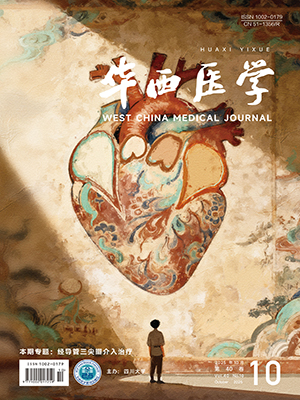| 1. |
国家卫生健康委办公厅, 国家中医药管理局办公室. 关于印发新型冠状病毒肺炎诊疗方案(试行第七版)的通知. (2020-03-04)[2020-04-05]. http://www.nhc.gov.cn/xcs/zhengcwj/202003/46c9294a7dfe4cef80dc7f5912eb1989.shtml.
|
| 2. |
Al-Tawfiq JA, Memish ZA. What are our pharmacotherapeutic options for MERS-CoV?. Expert Rev Clin Pharmacol, 2014, 7(3): 235-238.
|
| 3. |
Cao B, Wang Y, Wen D, et al. A trial of lopinavir-ritonavir in adults hospitalized with severe COVID-19. N Engl J Med, 2020, 382(19): 1787-1799.
|
| 4. |
Wang M, Cao R, Zhang L, et al. Remdesivir and chloroquine effectively inhibit the recently emerged novel coronavirus (2019-nCoV) in vitro. Cell Res, 2020, 30(3): 269-271.
|
| 5. |
陈军, 凌云, 席秀红, 等. 洛匹那韦利托那韦和阿比多尔用于治疗新型冠状病毒肺炎的有效性研究. 中华传染病杂志, 2020, 38(2): 86-89.
|
| 6. |
中华人民共和国卫生部. 药品不良反应报告和监测管理办法. (2011-05-04)[2020-04-05]. https://www.nmpa.gov.cn/xxgk/fgwj/bmgzh/20110504162501325.html.
|
| 7. |
食品药品监管总局. 食品药品监管总局关于印发药品不良反应报告和监测检查指南(试行)的通知. (2015-07-02)[2020-03-05]. https://www.nmpa.gov.cn/directory/web/nmpa/xxgk/fgwj/gzwj/gzwjyp/20150702120001584.html.
|
| 8. |
Vogel M, Rockstroh JK. Safety of lopinavir/ritonavir for the treatment of HIV-infection. Expert Opin Drug Saf, 2005, 4(3): 403-420.
|
| 9. |
陈清, 张丽兰, 于德宪, 等. 重组人干扰素α-2b喷雾剂人群试验的安全性评价. 中华实验和临床病毒学杂志, 2005, 19(3): 211-215.
|
| 10. |
Lu H. Drug treatment options for the 2019-new coronavirus (2019-nCoV). Biosci Trends, 2020, 14(1): 69-71.
|
| 11. |
Chan KS, Lai ST, Chu CM, et al. Treatment of severe acute respiratory syndrome with lopinavir/ritonavir: a multicentre retrospective matched cohort study. Hong Kong Med J, 2003, 9(6): 399-406.
|
| 12. |
宋杲, 成梦群, 魏贤文. 新型冠状病毒(2019-nCoV)治疗药物体内外研究及药物研发进展. 病毒学报, 2020, 36(2): 300-305.
|
| 13. |
Chen N, Zhou M, Dong X, et al. Epidemiological and clinical characteristics of 99 cases of 2019 novel coronavirus pneumonia in Wuhan, China: a descriptive study. Lancet, 2020, 395(10223): 507-513.
|
| 14. |
Huang C, Wang Y, Li X, et al. Clinical features of patients infected with 2019 novel coronavirus in Wuhan, China. Lancet, 2020, 395(10223): 497-506.
|
| 15. |
Wang D, Hu B, Hu C, et al. Clinical characteristics of 138 hospitalized patients with 2019 novel coronavirus-infected pneumonia in Wuhan, China. JAMA, 2020, 323(11): 1061-1069.
|
| 16. |
Guan WJ, Ni ZY, Hu Y, et al. Clinical characteristics of coronavirus disease 2019 in China. N Engl J Med, 2020, 382(18): 1708-1720.
|
| 17. |
Xu Z, Shi L, Wang Y, et al. Pathological findings of COVID-19 associated with acute respiratory distress syndrome. Lancet Respir Med, 2020, 8(4): 420-422.
|
| 18. |
Boriskin YS, Leneva IA, Pécheur EI, et al. Arbidol: a broad-spectrum antiviral compound that blocks viral fusion. Curr Med Chem, 2008, 15(10): 997-1005.
|
| 19. |
Pshenichnaya NY, Bulgakova VA, Lvov NI, et al. Clinical efficacy of umifenovir in influenza and ARVI (study ARBITR). Ter Arkh, 2019, 91(3): 56-63.
|
| 20. |
Wang Z, Chen X, Lu Y, et al. Clinical characteristics and therapeutic procedure for four cases with 2019 novel coronavirus pneumonia receiving combined Chinese and Western medicine treatment. Biosci Trends, 2020, 14(1): 64-68.
|
| 21. |
曹瑜. 盐酸阿比多尔片在治疗急性呼吸道病毒感染中的安全性与有效性观察. 中国现代药物应用, 2018, 12(17): 101-103.
|
| 22. |
Deng P, Zhong D, Yu K, et al. Pharmacokinetics, metabolism, and excretion of the antiviral drug arbidol in humans. Antimicrob Agents Chemother, 2013, 57(4): 1743-1755.
|
| 23. |
Ramírez-Olivencia G, Estébanez M, Membrillo FJ, et al. Use of ribavirin in viruses other than hepatitis C. A review of the evidence. Enferm Infecc Microbiol Clin (Engl Ed), 2019, 37(9): 602-608.
|
| 24. |
Cheng WT, Li CK, Leung TF, et al. Ribavirin for SARS in children. Clin Pediatr (Phila), 2004, 43(2): 193-196.
|
| 25. |
Poutanen SM, Low DE, Henry B, et al. Identification of severe acute respiratory syndrome in Canada. N Engl J Med, 2003, 348(20): 1995-2005.
|
| 26. |
Loustaud-Ratti V, Stanke-Labesque F, Marquet P, et al. Optimizing ribavirin dosage: a new challenge to improve treatment efficacy in genotype 1 hepatitis C patients. Gastroenterol Clin Biol, 2009, 33(6-7): 580-583.
|




